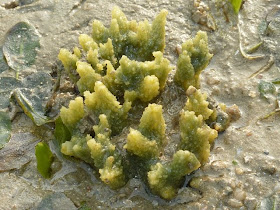
Only the sessile or immobile creatures still remained exposed during the low tide. I think these blue branching sponges are very pretty together with the rock. I have no idea why some ends are white in colour though.

Another type of sponge will be this greenish yellow one which looks like a castle with some imagination.
Since the shore looks bare and lifeless due to the heat and sun, James and I decided to flip rocks where the animals are probably hiding since its wetter and cooler beneath. And yes! We found many more critters!

One of my most favourite is definitely a sea star and this one is four-armed. This is the Crown sea star (Asterina coronata) which we sometimes also say it is a rock star since it is usually found beneath rocks. James was really sharp was he spotted a real tiny crab beside the star. Can you spot the crab?

After more flipping of rocks (and of course putting them back properly after which), I found another but smaller Crown sea star. This time I remembered to take a photograph of the underside of the star.

James found quite a number of these Purple under-a-stone sea cucumbers that are not exactly under a stone but facing upwards. Haha.

Another of the underneath-a-rock animal found will be this Hoof-shield limpet (Scutus sp.). Its body is a lot larger than its shell, usually folded up around the edges of the shell and may cover most of the shell.

More blobs! These blobs are probably ascidians. I like the pink lines or stripes.

I was surprised to see this Wandering cowrie (Cypraea errones) laying eggs. It's my first time seeing this action.

There were more wandering cowries at other rocks and I took a photo of this living cowrie with its mantle retracted back into the shell exposing the shiny shell. Can you see our reflections from the surface of the cowrie? :)

There were many Thunder crabs (Myomenippe hardwickii) that were all hiding beneath bigger rocks! Though they are out of sight, these crabs are abundant on this shore.

Also found under a rock will be this scale worm. The last time I've seen this was at Pulau Hantu. This polychaete is, I think, rather related to the more scary bristleworm.
Enough of under the rocks! Here's the animals that was seen elsewhere from rocks.

I found this clam with dark lines that is still alive. Usually their shells are found washed up. It looks similar to the Venus clams.

James, with his usual sharp observations found a number of these tiny yet rather soft bivalves. We absolutely have no idea what they are.... hmm.

As for me, I found an action packed Haddon's carpet anemone (Stichodactyla haddoni) that is halfway feasting on a crab. Yum yum for the anemone.

As it was hot and daylight, I only get to see a couple of the usually plentiful Plain Sand star (Astropecten sp.).

Some of us are fascinated by the Snapping shrimps (Family Alpheidae). They look cute with their enlarged claws that make the clipping or snapping sounds. These sound help the shrimps to shunt predators away.

Among the tide pools, I saw a few of the juvenile catfishes swimming about. Yes they are small, just use the Spoon seagrass (Halophila ovalis) as a scale for comparison of size.

I must say today is the day we see so many of these Three-spined toadfishes (Batrachomoeus trispinosus). All of them we saw today were beneath rocks.
As their name suggests, they can croak like a toad but do not also try to touch as they may bite!

Towards the end of the trip, I saw a stranded pinkish jellyfish. With James' help, the jellyfish was placed in water for it to recover from the stress. And it looked much more pretty when it is more relaxed.

And just 5 minutes before the stipulated end time of the trip, I flipped the last few rocks and here we have, thank God, the finale and also the most special find of the day: Rose nudibranch (Dendrodoris fumata). I remember I also last saw this stunning nudibranch by flipping rocks at St John's Island.

Here's the underside of this special nudibranch. Don't you think it's cute.
It's great to know that there's still wonderful finds to be sighted at Pasir Ris. :)
No comments:
Post a Comment